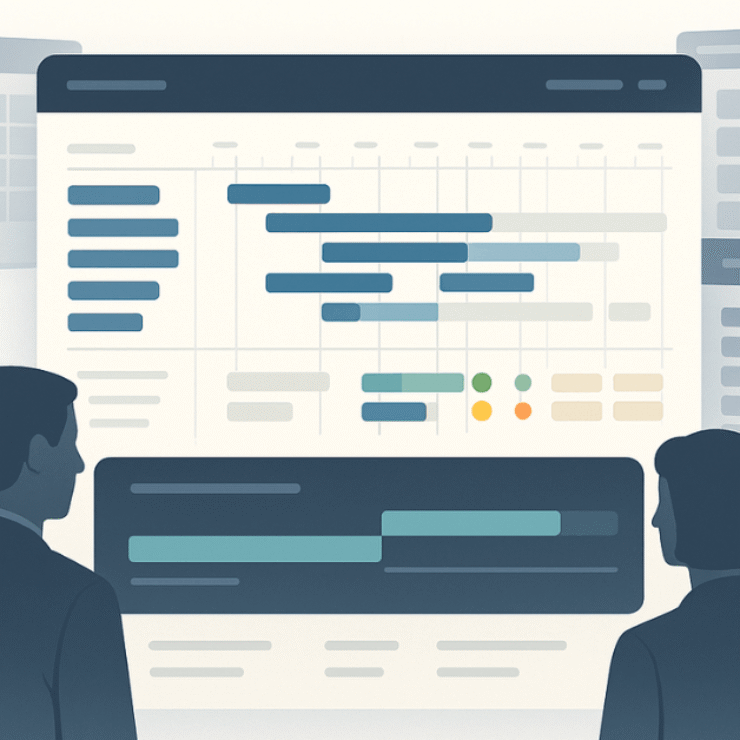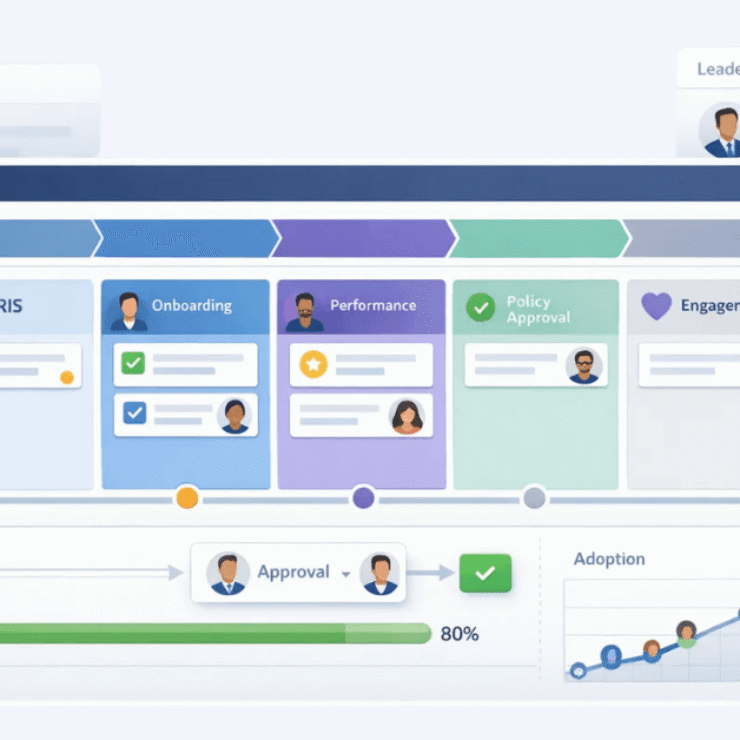Introduction
The project’s success largely relies on the project management approach. Planning and executing a project with strategy demands a lot of effort and expertise. By employing the right project management strategy you can facilitate transparent client communication, mitigate the risk of failure, and go beyond the client’s expectations.
Whether you are a veteran project manager or a newbie, embracing innovative project management practices will upscale your skills and performance. These practices will elevate your efficiency, equip you to tackle challenges adeptly and empower you to make timely, informed decisions for managing projects effectively.
Today in this blog, we have curated 13 project management best practices to integrate into your project management skillset. These practices will definitely improve the outcome and lessen your burden as a manager.
Project Management Best Practices
-
Define Clear Objectives
Establishing clear objectives marks the pivotal starting point for kickstarting any project. This involves drafting a preliminary framework outlining the project’s goals, deliverables, constraints, and other pertinent details.
To define the project’s objectives, you can hold a meeting with your stakeholders to address key aspects of the project. Ask questions, solve doubts, and clear the purpose of developing the project. Some of the common questions to be addressed for defining the purpose of the project are:
- What needs to be done?
- What are the expected project results?
- What is the budget allocated for the project?
- What will be the success ratio of the product developed?
- What resources will be involved in the development of the project?
- What are the risk factors involved in the development of the project?
- What are the project deliverables and how are they assessed for validity, utility, correctness, and completeness?
-
Develop a Detailed Plan
Everyone knows that planning leads to perfection. Developing a detailed plan before starting your project will help you a lot. It will define the starting point and the end point of your project. You will be able to hit the targeted milestones effectively.
Creating a detailed work plan is a lot more than just listing the tasks of the project. It is about identifying the goals, foresight hurdles, and strategizing solutions.
The essential components for developing a thorough plan for managing projects effectively include:
- Setting goals
- Deciding the timeline of tasks
- Prioritizing objectives
- Identifying and utilizing resources
- Monitoring and addressing hurdles
-
Effective Communication
Communication is important and effective communication is rewarding. As a project manager, maintaining constant connectivity with every member associated with the project is paramount. Whether it’s stakeholders or service providers, fostering effective communication with everyone throughout the project lifecycle is essential.
The benefits of effective communication include:
- Better understanding of the project
- Easy identification of obstacles
- Improved solutions to overcome issues
- Involved client to oversee the process
- Attainment of Impeccable final product
-
Risk Management
Risks are an implicit part of any successful project. Flawless products always come out tarnishing the risks. As a project manager, you must invest some time in forecasting the risk factors involved in the completion of a project and find solutions to overcome or prevent it.
You should also keep your team ready for unexpected challenges to arrive during the project execution. You can also establish a dedicated risk response team to tackle risky situations and maintain smooth project execution.
Ultimately, implementing a comprehensive risk management plan would help you overcome the project hurdles smoothly with minimal stress.
-
Resource Management
Availability of resources is always a constraint at the onset of any project. It’s common for team members to have competing commitments, juggling multiple projects at a single time.
Being an intelligent project manager, it is imperative for you to keep a resource plan to monitor the availability of crucial project resources. Aligning your work around their schedules will help you optimize their availability effectively.
Utilizing project management tools like Karya Keeper, Kantata, Wrike, etc. can greatly aid effective resource management. It effectively shows how the resources are allocated to different projects and where you can utilize their availability.
-
Stakeholder Engagement
Ensuring active participation from stakeholders throughout the project is essential. This approach focuses on a client-centric vision of the project. Conduct catchup meetings with clients to keep them informed about the project progress, ask for feedback, and incorporate it proactively to minimize the need for minor adjustments.
-
Quality Assurance
Establish clear quality benchmarks to achieve the desired goal. Prioritze the quality of the final product above everything else, maintaining unwavering standards. Collaborate with the team and stakeholders to articulate the project’s quality vision and establish measurable quality criteria. Always deliver beyond expectations.
Some tips to ensure rigorous quality assurance throughout the project are:
- Divide the project into distinct stages of deliverables
- Define quality standards by reviewing past projects and market analysis.
- Validate the established quality standards.
- Maintain open communication with stakeholders to align on and continuously refine quality expectations.
-
Change Management
The new requests or add-ons can kick in anytime during the project execution. It can take a lot of your time and create glitches in the running process. As a responsible project manager, you must keep space for these scope creep challenges.
The best method to handle such challenges is to communicate with stakeholders, discussing the impact of their new requirements on the project in terms of timeline, budget, and final deliverables. If everyone agrees and is on the same page, document the new requests and proceed further accordingly.
-
Performance Monitoring and Control
Monitoring project execution thoroughly is one of the project manager’s best practices. This proactive approach increases the scope of improvement and perfection during the execution itself. With effective performance monitoring, you can identify past errors, anticipate potential pitfalls, and implement necessary measures to mitigate risks.
Performance monitoring and control practice can be done by conducting team meetings, reviewing work, understanding the loopholes, offering guidance to team members, and collaboratively devising solutions to emerging challenges.
-
Team Collaboration and Coordination
Having a collaborative team with all members enthusiastic and supportive is a dream come true for a project manager. However, achieving this requires deliberate effort and understanding of each team member’s unique characteristics and tendencies.
To cultivate such a dream team you have to indulge in office dynamics adeptly, build connections, negotiate with employees, and leverage your influence when necessary. All these practices are instrumental in securing vital resources and positioning yourself to effectively execute projects to success.
-
Use of Project Management Tools and Software
Project management tools serve as invaluable assets for project managers, forming the cornerstone of modern project management best practices. These tools provide multifaceted support, ranging from optimizing project workflows and bolstering visibility and control to facilitating efficient resource allocation and beyond.
Of course, Software like Karya Keeper, Kissflow, and Mosiac are some outstanding project management tools you can count on. It incorporates all the necessary modules to make you work faster and more effectively.
-
Document Lessons Learned and Best Practices
Always document the learnings you have earned through your projects. Record the lessons learned during the execution of certain projects to incorporate them into coming ones.
Conduct post-project reviews, identify root causes of success and challenges in a project, establish a repository of valuable insights, utilize these insights to refine training programs, etc. All these practices will enhance organizational readiness for future projects, fostering continual growth and advancement.
-
Continuous Improvement
Continuous Improvement in any project involves an ongoing commitment to refining processes, enhancing efficiency, and optimizing outcomes. It is about fostering a culture of innovation, learning, and comprehending the adaptability to evolving project requirements.
By embracing continuous improvement, organizations can achieve greater project success rates, streamline operations, and drive sustainable growth and innovation.
Conclusion
Implementing all these above practices in your project management journey will definitely sky scrap your abilities as a brilliant project manager. These project manager best practices will enhance your ability to gel with your team, technical knowledge to solve queries, and adaptability to unfavorable situations making you the perfect project manager for your team.
It will refine your role as a project manager, you will evolve more, and will be able to lead your team with confidence.



